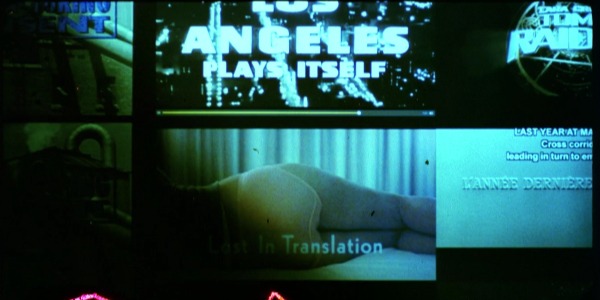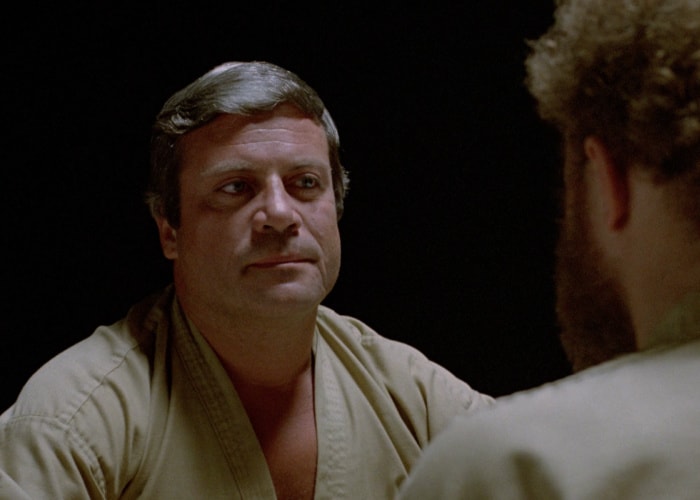FILM TITLE POEM: Matching Experimental Charms With Cynical Cinephilia
Movies love the movies. From Man with a Movie Camera to Schizopolis, many iconic films are drenched in cinephilia and self-referentiality. But no movie loves movies as much as Film Title Poem, a 67-minute experimental traversal of film history, both canonical and personal, entirely by way of title cards.
Watching Jennifer West’s Film Title Poem is a bit like being locked in a room with a stranger for an hour while they recite for you their Letterboxd activity. Perhaps for that reason, many angry Letterboxd reviewers argue that the film’s better off playing at art galleries, where pompous New York popinjays can wander in and pretend to be intrigued for a few minutes, then take a cab back to their posh apartments and never think about the movie again.
Once the film starts, it doesn’t let up — just one title card after another at an unrelenting pace, like prolonged falling, as West takes us from 2001: A Space Odyssey up the alphabet to Zorns Lemma. The scrubber and corners of the screen are usually in the shot, as though she’s filming her computer playing the films on YouTube. The titles are kind of arranged alphabetically, though West breaks that rule as often as she keeps it. The frame is dark, and a little flashlight illuminates words in the titles, like a burglar in a movie theater.
Poetry In Motion
As its title suggests, maybe the film is best imagined as a poem in motion, like the cinépoème works that Man Ray created in the 1920s and ’30s. But unlike most experimental cinema poems, West’s work isn’t alienating, pretentious, or gauche. One of my favorite “verses” highlights the movie’s playfulness and its varied palate:
Enter the Dragon
Enter [music changes…]
The [music changes…]
Void [music changes…]
Enter the
Mask
Enter [music changes…]
The [music changes…]
Liquid Sky
Enter [music changes…]
The [music changes…]
28 Days Later…
Adding personality to the title cards are “glitches”, little abnormalities like grouped dots or chicken scratch marks that white out parts of the screen. They pop up for a few frames, then leave, as though the director accidentally scratched the 35mm film.

In her introduction to the film on MUBI, West says that the glitches are very purposeful — she calls this practice “radical materiality”. For over 80 films, she’s corroded, tinted, and altered analog filmstrips by cooking them in eggs, soaking them in urine, skateboarding over them, or dunking them in Utah’s Great Salt Lake.
In Film Title Poem, the glitches also appear as scribbled shapes on the screen. They, too, initially look like crude mistakes, but they morph into waves for Point Break, a lightning bolt for Harry Potter and the Sorcerer’s Stone, and pills for The Matrix. The scribbles add a fluttery quality to the film, as though the picture is alive and commenting on the titles as we’re seeing them.
A Bit Like Time Traveling
Most surprising in Film Title Poem are the aimlessness and lack of self-importance. There’s neither narrative nor much of a destination aside from the inevitable end of the alphabet, putting more emphasis on soaking up the title cards (West calls them “movie memories”) as they flash on the screen.
More abstract than other experimental films, like Jodie Mack’s The Grand Bizarre, and far less didactic than Jean-Luc Godard’s similarly ciphered The Image Book, West’s film exists entirely in the metatext. It offers little besides what we bring to it and relies on its cinephile audience to forge connections in, for instance, a cut from The Passion of Joan of Arc to The Pink Panther, just as Godard’s film cuts from ISIS footage to Vertigo.
In giving all the power to the spectator, the film reminded me of H.G. Wells’ The Time Machine. That story’s protagonist, the Time Traveller, is flung into the far future and scrambles about in the darkness amidst humanity’s ruins. The film’s aesthetics conjure an image of an intrepid explorer, out of time, chancing upon artifacts of human civilization from the late 1800s to 2016 (when Film Title Poem was released), trying to use the title design and limited vocabulary to make sense of this lost art and language.
From there, with our Time Traveller hats on, Film Title Poem lets us study the title card as an art form unto itself. We can appreciate the stark, digitized font of AVP: Alien vs. Predator, the Y2K drab normalcy of Reality Bites, and the hazy net cyberpunk sense of Hackers. If our Traveller doesn’t speak English, then linguistically, Orlando and Synchromy are forgiving — they’re just lone words against empty voids. But then what would our Traveller make of One Week, a Buster Keaton short where Keaton’s billing is as large as the title? And anthropologically, how would they approach Pokémon: The First Movie without knowledge of the show? Would they assume that Pokémon was indeed the first movie and the genesis of cinema?
Zorns Lemma And Structural Films
With its whimsical presentation and elusive nature, West’s film is strangely amiable. The sneaky cinematography carried out with the help of Peter West, and the lively animation, with help from Kelsey Boncato and Sadie Marchese-Moore, creates a film altogether mysterious and energetic. I really enjoyed Film Title Poem, in the same way, that I enjoyed getting tested for COVID — both are short, uncomfortable, bizarrely thrilling sensations you’re unlikely to experience anywhere else again.
The film is a test of cinephilia, but at the same time, Film Title Poem is slyly cynical. It recontextualizes cinematic canon and the simulacrum of film history, using recurring titles as motifs to create a grotesque mirror of our collective cultural memory.
Much like the experimental films of Man Ray and Hollis Frampton, Film Title Poem is less about what we experience than it is about the process of experiencing. The final title card we see is that of Frampton’s Zorns Lemma, and I can’t help but feel like that was intentional.
Zorns Lemma is a 1970 structural film that rhythmically recreates the alphabet using street signs, urban landscapes, and abstract symbolism. Its central 47 minutes repeatedly tick upward from A to Z, mirroring the trajectory of West‘s film. But while they have definitive structures, neither film gives the audience narrative predictability. They’re each barely accessible and reward viewers who pay close attention.

In a 1971 article about Zorns Lemma in Artforum, critic Wanda Bershen wrote, “Most conventional narrative films […] place their viewers within the complex web of their own feelings and responses. Structural films do just the opposite by refusing the viewer all such pleasures, thus producing rather a rude confrontation. What is this thing that calls itself a movie? That is the underlying question posed by structural cinema.”
Cinephilia And Cynicism
It’s hard to figure out the methodology behind West’s organization. We return frequently to Citizenfour; Citizen Kane; Dance, Girl, Dance; Pink Flamingos; Mask; and The Matrix, but with no explicit reason. Are these West’s favorite films or maybe ones she has fond memories of? Or are they simply the last 500 or so she’s seen? And why does she interrupt her alphabetical system so often?
The film invites its audience to ask questions and critically consider the canon she’s putting forth. Cinephilia, after all, isn’t a science, and West is doing what every movie-lover does when they create a Letterboxd list or rank their favorite films. She collects the leaves blowing off the trees, as many as she can hold, and assembles them into patterns, trying to make sense and structure of the structureless.
West‘s intentions might have been celebratory, but the cold distance of the experimental modality better lends itself to critiquing “movie memories” and our experiences with films. Detractors of Film Title Poem decry that it’s boring and pretentious — but perhaps that’s the point.
The films don’t come with her quick reviews, first impressions, or anecdotes. There’s neither context nor emotion. Is West intentionally championing a cynical view of cinephilia? If nothing else, Film Title Poem coherently illustrates how attempting to structure an unwieldy canon and confining and pruning an entire art form into our favorite masterworks is an exercise inherently useless to everyone but ourselves.
It’s also a practice that, as the current Criterion controversy and ongoing Twitter canon debates indicate, excludes worthy films and filmmakers in favor of the popular, sidelining great art to make room for the easily digestible. Film Title Poem outlines the limits of cinephilia — how the love of cinema has devolved into cliques and the scaffolding of an existing pantheon of commonly accepted great art, unable to provide any revolutionary thought.
Conclusion
Anyone can make their own Film Title Poem, but what separates West’s film from any other hypothetical cinépoème is her ingenuity and intelligence as a filmmaker, as well as her ability to make us see the links between these films and to connect with her effort to catalog them.
Perhaps that’s why Film Title Poem has no title card of its own. The movie only reflects the culture wrapped around it, showing us the cold detachment of cinephilia, devoid of context, and meaning. But it also relishes cinema’s materiality, wanting so much to recognize other films and the act of experiencing them that it cannot be bothered to make room for itself among them.
Many lack the longanimity to soak up West’s project — it is an hour-plus of title cards, after all. But viewers willing to play-act as Travellers into the unknown will find an ethereal, otherworldly experiment, perhaps one that makes us reckon with our cinephilia and consider the works that have shaped us the most.
What do you think of Jennifer West’s Film Title Poem? Let me know in the comments below!
Film Title Poem is streaming worldwide on Mubi.
Watch Film Title Poem
Does content like this matter to you?
Become a Member and support film journalism. Unlock access to all of Film Inquiry`s great articles. Join a community of like-minded readers who are passionate about cinema – get access to our private members Network, give back to independent filmmakers, and more.
Join now!





